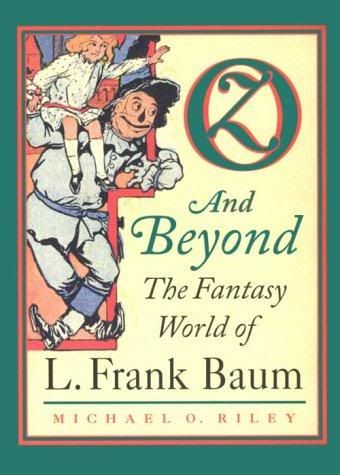So, remember how I said I read the backlog of The Baum Bugle? All those reviews made my want list soar! So, I'm slowly managing it so my bank account isn't left sore. (Tip for collecting: look around!)
Well, there's some fiction, and some non-fiction. Oz and Beyond: The Fantasy World of L. Frank Baum is by Michael O. Riley who is an expert at binding books and printing them. In fact, he has even reprinted short Oz-related works in pamphlet form with his very own printing press and I happen to have two of them in my collection. He's also been at Winkies both times I've attended and I hope he'll be back next time! I want him to sign my copy of his book!
Oz and Beyond looks at L. Frank Baum's fantasy writing as it developed from about 1897 to 1919. Riley also examines Baum's life without pretending at some funny agenda. He theorizes that Baum, who identified with children very well, missed his happy childhood days and points out supporting examples in his works. That's the most when it comes to drawing conclusions here. The book depicts Baum as a very real person by putting his writing in perspective with his life. It believably explains why Baum published many books in 1900 and 1901 and suddenly went to one fantasy under his real name a year shortly after.
Each book is given its own section. It begins with A New Wonderland (later The Magical Monarch of Mo), as Riley correctly notes that the Phunnyland stories were the first fantasy stories Baum wrote. Mainly, the rest of Baum's fantasy work (including the "Laura Bancroft" Twinkle Tales and Policeman Bluejay) is followed as they were published, a big exception being that about 1905, there is a section for King Rinkitink.
In the Rinkitink section, Riley surmises the book must have had a defeat of the Nome King and then a return to Pingaree. It seems plausible, and is likely the case. (I more or less said the same thing when I reviewed the book.) It's a nice way to appreciate the story on its own. Later, the revised version Rinkitink in Oz is covered, looking at why Baum dusted off a previously unpublished manuscript, and how the story was affected by turning it into an Oz story.
Riley spends a lot of time looking at how the Land of Oz develops in each Oz book, how it's vast in Wonderful Wizard, then shrinks in Marvelous Land, then varies in size until becoming vast again in the latter Oz books. He also looks at how the rules and mythology of Oz change in the series.
You might think I've done the same thing in my blogging, but I tend to look at the Land of Oz as a finished whole, while Riley examines it as it developed. Riley reminds us that unlike later fantasy series of the 20th century, Oz was not begun as a series. It was a book, then a book and a sequel, then a book, a sequel, and a series, then an ongoing series. Thus, the development of Oz under Baum is rather uneven, a point Riley drives home. However, rather than making Oz seem inferior, it reads more like Baum was polishing a valuable stone to show its true luster.
As Riley focuses on Baum's fantasy world, he does not give the same treatment in the book to the Oz books of Thompson, Neill, Snow, Cosgrove, and the McGraws. They are acknowledged and gone over briefly, however. Furthermore, he acknowledges their later Oz works and the new run of Oz books by fans that had begun trickling in the 1980s. However, he stresses his work in this book is not to examine Oz the continuing legacy and the core, but just the core.
Sometimes, that simple approach, to just stop and examine one area indepth, works best. Michael Riley did a great job.
Monday, March 05, 2012
Subscribe to:
Post Comments (Atom)




No comments:
Post a Comment